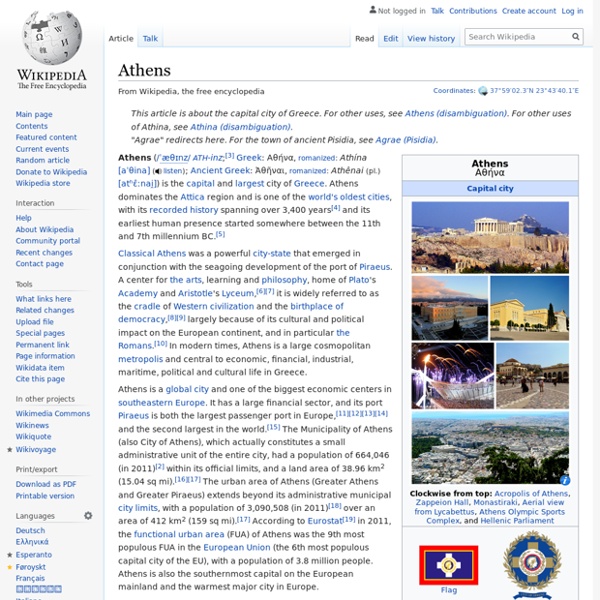Proserpina
Ancient Roman goddess Cult and myths[edit] Origin as Libera[edit] Libera was officially identified with Proserpina in 205 BC, when she acquired a Romanised form of the Greek mystery rites and their attendant mythology.
Aeschylus
ancient Athenian tragic playwright Aeschylus (,[1] ;[2] Greek: Αἰσχύλος Aiskhylos, pronounced [ai̯s.kʰý.los]; c. 525/524 – c. 456/455 BC) was an ancient Greek tragedian. He is often described as the father of tragedy.[3][4] Academics' knowledge of the genre begins with his work,[5] and understanding of earlier tragedies is largely based on inferences from his surviving plays.[6] According to Aristotle, he expanded the number of characters in the theatre and allowed conflict among them; characters previously had interacted only with the chorus.[nb 1]
Pygmalion
Pygmalion or Pigmalion may refer to: Mythology[edit] Stage[edit]
Danaïdes
mythical characters Mythology[edit] Danaus did not want his daughters to go ahead with the marriages and he fled with them in the first boat to Argos, which is located in Greece near the ancient city of Mycenae. Danaus agreed to the marriage of his daughters only after Aegyptus came to Argos with his fifty sons in order to protect the local population, the Argives, from any battles. The daughters were ordered by their father to kill their husbands on the first night of their weddings and this they all did with the exception of one, Hypermnestra, who spared her husband Lynceus because he respected her desire to remain a virgin. Danaus was angered that his daughter refused to do as he ordered and took her to the Argives courts.
Pyramus and Thisbe
Plot[edit] In Ovid's Metamorphoses, Pyramus and Thisbe are two lovers in the city of Babylon who occupy connected houses/walls, forbidden by their parents to be wed, because of their parents' rivalry. Through a crack in one of the walls, they whisper their love for each other. They arrange to meet near Ninus' tomb under a mulberry tree and state their feelings for each other. Thisbe arrives first, but upon seeing a lioness with a mouth bloody from a recent kill, she flees, leaving behind her veil.
Keroessa
Story[edit] According to the historian Hesychius of Miletus,[3] as Io, changed into a heifer and being chased by a gadfly on behalf of the jealous Hera, was passing through Thrace, she gave birth to a girl, Keroessa, on the banks of the Golden Horn, by the altar of the nymph Semestra. Keroessa was reared by Semestra and grew up surpassing other local maidens in beauty. She had intercourse with Poseidon and in due course gave birth to a son, whom she named Byzas. He became the founder of Byzantium and named the Golden Horn (Greek Χρυσόκερας) after his mother.
Pyrrha
Deucalion and Pyrrha throwing rocks that become babies. Etymology[edit] In Latin the word pyrrhus means red from the Greek adjective πυρρός, purrhos, i.e. "flame coloured", "the colour of fire", "fiery red" or simply "red" or "reddish".[2][3] Pyrrha was evidently named after her red hair as Horace[4] and Ovid describes her as red haired. Mythology[edit] When Zeus decided to end the Bronze Age with the great deluge, Deucalion and his wife, Pyrrha, were the only survivors.
Juno
From Wikipedia, the free encyclopedia Jump to navigationJump to search Juno could mean: Music[change | change source] Vehicles[change | change source]
Ionians
The location of ancient Ionia on the coast of modern-day Turkey. When referring to populations, “Ionian” defines several groups in Classical Greece. In its narrowest sense, the term referred to the region of Ionia in Asia Minor. In its broadest sense, it could be used to describe all speakers of the Ionic dialect, which in addition to those in Ionia proper also included the Greek populations of Euboea, the Cyclades, and many cities founded by Ionian colonists.
Juno
From Wikipedia, the free encyclopedia Jump to navigationJump to search Juno may refer to:
Mathematician
A mathematician is someone who uses an extensive knowledge of mathematics in his or her work, typically to solve mathematical problems. Mathematics is concerned with numbers, data, quantity, structure, space, models, and change. History
Britannica
Mercury, Latin Mercurius, in Roman religion, god of shopkeepers and merchants, travelers and transporters of goods, and thieves and tricksters. He is commonly identified with the Greek Hermes, the fleet-footed messenger of the gods. The cult of Mercury is ancient, and tradition has it that his temple on the Aventine Hill in Rome was dedicated in 495 bce.



